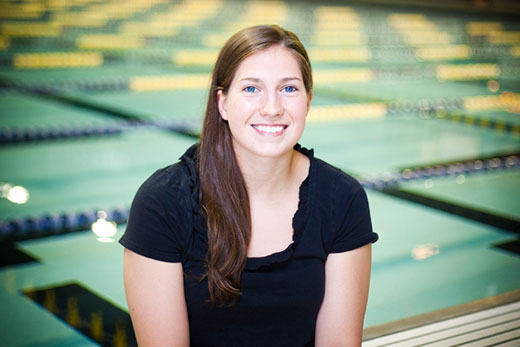When Claire Pavlak appears as a student marshal for the Emory College of Arts and Sciences at Commencement, observers will see a strong, confident scholar — an anthropology major and global health minor with a job already awaiting her.
What they won't see are the hours — the countless hours, dutifully logged in chlorinated water — that have propelled her toward a goal that once seemed only a dream.
Beyond the academics is the athlete: a standout swimmer who has earned nine
individual NCAA championships — more than any swimmer in the program's history — and 20 All-American honors — the second-most by any athlete in Emory's history. This spring, the co-captain's talents helped the Emory women's swimming and diving team win its third-consecutive NCAA Division III Championship.
Now, she's poised to go where no Emory swimmer has gone before.
In March — on a last-minute impulse — Pavlak qualified to attend the U.S. Olympic Team Trials to be held this summer in Omaha, Neb., where she'll compete in the 50-meter freestyle for the chance to join the 2012 U.S. Olympic swimming team.
Nothing to lose
The opportunity to qualify for the Olympic swim trial came suddenly.
At the conclusion of the NCAA championship meet, held in Indianapolis, Ind., organizers decided they had enough interest — and the requisite 50-meter pool — to conduct a time trial.
"I'm a senior, and I'd always thought the nationals would be my last meet," says Pavlak, a 21-year-old Ohio native. "But I thought I'd give it a try."
Conditions were far from ideal. Pavlak had competed in 13 races over the past
four days, anchoring three relay teams. An awards banquet on the final day kept her out past midnight. The time trial would be early the next morning.
"She's very much a classic overachiever — throw a challenge at her and she's all in," says Jon Howell, Emory's head swim coach. "It was one of those events where she had nothing to lose."
Pavlak went in knowing only that she performs best when she can clear her mind and simply swim. "I had no feel for where the wall was," she recalls. "I just put my head down and went."
Her instincts paid off. To make the Olympic trials, she had to beat a time of 26.39 seconds. Pavlak finished in 26.29 seconds — a personal best. "Honestly, I think my best time before was 28.6 when I was about 14 years old," she laughs.
When the reality of her achievement sunk in, Pavlak threw her hands up in disbelief. "It took me a few seconds to realize that I'd gone under the time. The entire team was there, too, which was a lot of fun."
"For the first few days it was kind of surreal, because [qualifying] was so unexpected," Pavlak says. "Now, I'm focusing on training my hardest."
The world's fastest swim meet
Following Commencement, Pavlak will remain on campus this summer to continue training, along with eight other Emory swimmers who hope to eventually qualify for the Olympic trial at later meets.
These days, she's logging long hours at the Woodruff PE Center natatorium — at least nine practices a week that run about 2-2.5 hours per session. In her spare time, she will serve as an assistant swimming coach for a summer league team at Druid Hills Golf Club.
"It will be a wonderful way to end my experience at Emory," Pavlak explains. "It's been a great four years for me. I don't think I could have asked for much more."
Howell credits Pavlak's groundbreaking achievement for helping move the Emory swim program forward. "She's one of those students who will make it possible for others in the future," he explains. "Having someone do what no one's done before makes it seem real."
2012 Olympic Team Trials, held June 25-July 2, are widely considered the world's fastest swim meet, a forum for showcasing the nation's top athletes. Pavlak welcomes the chance to compete at that level.
"The U.S. is a powerhouse in swimming," she says. "There will be a lot of Division I swimmers and professional swimmers. It's actually pretty rare for Division III swimmers to get to this point."
In fact, the U.S. Olympic swim trials are traditionally "faster than the actual Olympic meet," Howell notes, adding that swimmers will be pushed to achieve their best performances. The fact that an Emory student athlete will compete at that level represents a significant milestone and unprecedented national exposure.
"As the Emory program has gotten better, it's been fun to see [students] accomplish things that we haven't accomplished in the past," Howell acknowledges.
"People look at the program and assume that winning nationals automatically means we're successful. But now, we're looking beyond the traditional definition of success," he adds.
"I think we're charting some territory right now that's really unique. There's not really a blueprint for it."

